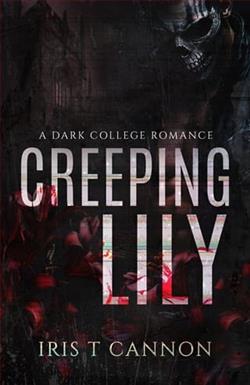Page 3 of Matches and Mistletoe
Master Belsher, the head of the town watch, heaved himself up from the table and said slowly, “If you don’t get in the bag, lass, we shall have to put you in. For the good of the village.”
The Felwitch let out a breath, almost a hiss. He shook out the sack, letting it fall open. Its mouth, wide as a wagon wheel, revealed nothing of its contents. The interior was inky black. Black as the lifeless pupils of Granda’s eyes.
Thistle thought of the cottage with Granda’s books, her clothes, and the maps she had created of lands that existed only in her mind.
“May I fetch my things?” she whispered.
The Felwitch shook his head. “We go now.”
At least she had her new book.
Thistle swallowed a sob. She crouched, leaning forward, and hunched into the sack, pushing deeper inside, deeper…
And then the Felwitch caught up the sack and cinched the mouth tight. The white light of the winter day winked out like a shrunken star. Thistle tumbled into blackness thick as pudding, into a cloying, vicious dark that surged around her and pressed at her eyeballs and pounded in her ears. She closed her lips tight against it, but the dark got into her nostrils and slithered down her throat, pooling in her belly. It writhed upward, miring and muddling her brain until she knew no more.
Her eyes blinked open, thickly, slowly. They felt heavy, as though each were glued shut by sticky sap.
A wooden ceiling arched above her—bright pine with dark knots. From pegs and nails all over the ceiling dangled innumerable strings of twirling, shining things—chips of crystal, shards of glass, dried berries, brittle pinecones, marbled beads, scraps of patterned fabric, small bones, curly wood shavings. Bits of objects salvaged or crafted.
Right above her face hung a string of tiny, delicate bird skulls. She thought she could reach out and touch the lowest one without fully straightening her arm. So she did.
The chain of skulls swung lightly at the touch.
“They’re not as fragile as they look,” said a voice. A voice of gravel and bones.
Thistle sat upright, knocking against the bird skulls with her own. “Felwitch,” she gasped.
He sat at a broad table cluttered with rusty tools, cracked pitchers, dented pots, castoff clothes, and rejected items of all sorts. His long, slender hands, clad in fingerless gloves, wandered over the detritus with skillful speed, plucking this piece and that snippet, attaching items together to form something altogether new. She couldn’t guess the final form of his project, but it bore an aesthetic resemblance to the playthings he’d given to the children of Embry Hollow.
His unmasked face was lean and serious. Pale skin, features almost too crisply cut, like birchwood chiseled but not smoothed or sanded.
Dark blue eyes lifted to meet hers. Only for a moment, and then his head bent over his work again, chestnut waves tumbling around his temples.
“I am not a witch,” he said absently, twisting a bit of twine around a peg. “I am one of the Wood Folk, the People. You might call me Fae.” And he brushed back some of his hair to show neatly pointed ears.
Thistle’s fingers curled against the bed, scrunching the patchwork fabric of the quilt beneath her. Her knuckles bumped against the spine of a leatherbound book—her midwinter gift. She rested one hand on it.
“I thought the Fae no longer existed,” she ventured. “That they all died out or moved on.”
“They did. All except me.”
“We have called you ‘the Felwitch’ for decades, and you did not protest.”
“Easier to let your people believe I was once human. They would be more frightened if they knew the truth.”
“And you’re telling me this because you want me to be afraid?”
“I don’t care whether you are afraid or not.”
The words were not comforting, but the nonchalance in his tone eased Thistle’s anxiety a little. Her fingers relaxed, and she swung her legs off the bed. She still wore the crimson stockings, leather boots, and thickly padded tunic she had donned that day, in preparation for outdoor festivities in the cold. Never had she expected to be in this chaotic burrow of a cabin, where teetering piles of salvaged goods threatened to topple over at the slightest nudge. The only clear spaces were the center of the room and the immediate vicinity of the fireplace.
“What happened to the other things that were in the sack with me?” she asked.
“They are waiting until I need them.”
“But the animals. Will they starve in there, in that thick darkness?”
“The animals are in the barn, recovering. They will be cured, renewed, and ready to return to your village by next midwinter.”















